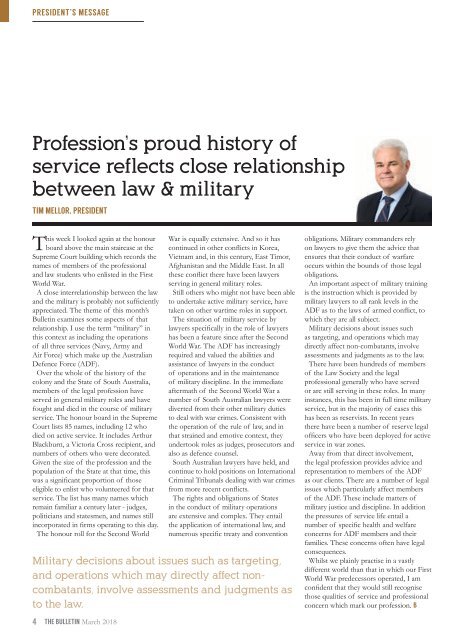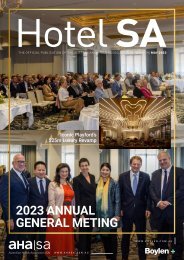LSB March 2018_Web
You also want an ePaper? Increase the reach of your titles
YUMPU automatically turns print PDFs into web optimized ePapers that Google loves.
PRESIDENT’S MESSAGE<br />
Profession’s proud history of<br />
service reflects close relationship<br />
between law & military<br />
TIM MELLOR, PRESIDENT<br />
This week I looked again at the honour<br />
board above the main staircase at the<br />
Supreme Court building which records the<br />
names of members of the professional<br />
and law students who enlisted in the First<br />
World War.<br />
A close interrelationship between the law<br />
and the military is probably not sufficiently<br />
appreciated. The theme of this month’s<br />
Bulletin examines some aspects of that<br />
relationship. I use the term “military” in<br />
this context as including the operations<br />
of all three services (Navy, Army and<br />
Air Force) which make up the Australian<br />
Defence Force (ADF).<br />
Over the whole of the history of the<br />
colony and the State of South Australia,<br />
members of the legal profession have<br />
served in general military roles and have<br />
fought and died in the course of military<br />
service. The honour board in the Supreme<br />
Court lists 85 names, including 12 who<br />
died on active service. It includes Arthur<br />
Blackburn, a Victoria Cross recipient, and<br />
numbers of others who were decorated.<br />
Given the size of the profession and the<br />
population of the State at that time, this<br />
was a significant proportion of those<br />
eligible to enlist who volunteered for that<br />
service. The list has many names which<br />
remain familiar a century later - judges,<br />
politicians and statesmen, and names still<br />
incorporated in firms operating to this day.<br />
The honour roll for the Second World<br />
4<br />
THE BULLETIN <strong>March</strong> <strong>2018</strong><br />
War is equally extensive. And so it has<br />
continued in other conflicts in Korea,<br />
Vietnam and, in this century, East Timor,<br />
Afghanistan and the Middle East. In all<br />
these conflict there have been lawyers<br />
serving in general military roles.<br />
Still others who might not have been able<br />
to undertake active military service, have<br />
taken on other wartime roles in support.<br />
The situation of military service by<br />
lawyers specifically in the role of lawyers<br />
has been a feature since after the Second<br />
World War. The ADF has increasingly<br />
required and valued the abilities and<br />
assistance of lawyers in the conduct<br />
of operations and in the maintenance<br />
of military discipline. In the immediate<br />
aftermath of the Second World War a<br />
number of South Australian lawyers were<br />
diverted from their other military duties<br />
to deal with war crimes. Consistent with<br />
the operation of the rule of law, and in<br />
that strained and emotive context, they<br />
undertook roles as judges, prosecutors and<br />
also as defence counsel.<br />
South Australian lawyers have held, and<br />
continue to hold positions on International<br />
Criminal Tribunals dealing with war crimes<br />
from more recent conflicts.<br />
The rights and obligations of States<br />
in the conduct of military operations<br />
are extensive and complex. They entail<br />
the application of international law, and<br />
numerous specific treaty and convention<br />
Military decisions about issues such as targeting,<br />
and operations which may directly affect noncombatants,<br />
involve assessments and judgments as<br />
to the law.<br />
obligations. Military commanders rely<br />
on lawyers to give them the advice that<br />
ensures that their conduct of warfare<br />
occurs within the bounds of those legal<br />
obligations.<br />
An important aspect of military training<br />
is the instruction which is provided by<br />
military lawyers to all rank levels in the<br />
ADF as to the laws of armed conflict, to<br />
which they are all subject.<br />
Military decisions about issues such<br />
as targeting, and operations which may<br />
directly affect non-combatants, involve<br />
assessments and judgments as to the law.<br />
There have been hundreds of members<br />
of the Law Society and the legal<br />
professional generally who have served<br />
or are still serving in these roles. In many<br />
instances, this has been in full time military<br />
service, but in the majority of cases this<br />
has been as reservists. In recent years<br />
there have been a number of reserve legal<br />
officers who have been deployed for active<br />
service in war zones.<br />
Away from that direct involvement,<br />
the legal profession provides advice and<br />
representation to members of the ADF<br />
as our clients. There are a number of legal<br />
issues which particularly affect members<br />
of the ADF. These include matters of<br />
military justice and discipline. In addition<br />
the pressures of service life entail a<br />
number of specific health and welfare<br />
concerns for ADF members and their<br />
families. These concerns often have legal<br />
consequences.<br />
Whilst we plainly practise in a vastly<br />
different world than that in which our First<br />
World War predecessors operated, I am<br />
confident that they would still recognise<br />
those qualities of service and professional<br />
concern which mark our profession. B


















